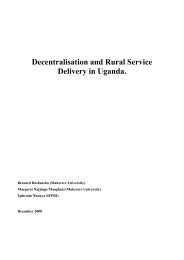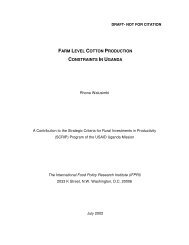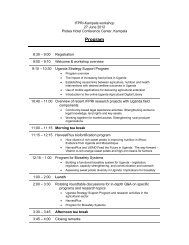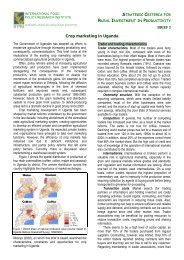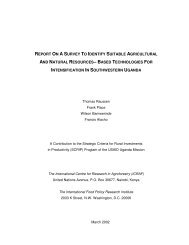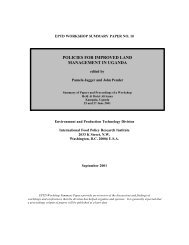The Future of Smallholder Farming in Eastern Africa - Uganda ...
The Future of Smallholder Farming in Eastern Africa - Uganda ...
The Future of Smallholder Farming in Eastern Africa - Uganda ...
Create successful ePaper yourself
Turn your PDF publications into a flip-book with our unique Google optimized e-Paper software.
Groups have become more important as extension service has moved away from a<br />
tra<strong>in</strong><strong>in</strong>g-and-visit approach to a demand-driven 22 fee-for-service approach. Where poverty<br />
prevails, the majority <strong>of</strong> smallholder farmers cannot afford to pay for extension services. As a<br />
result, groups are now becom<strong>in</strong>g entry po<strong>in</strong>ts for the extension service, because they can<br />
reach many farmers at the same time at lower cost. Groups are also <strong>in</strong>valuable for<br />
<strong>in</strong>ternaliz<strong>in</strong>g the concept <strong>of</strong> tra<strong>in</strong><strong>in</strong>g <strong>of</strong> tra<strong>in</strong>ers. For example, groups or committees can and<br />
actually have been tra<strong>in</strong>ed to lay terraces. <strong>The</strong>se people are then able to lay terraces for<br />
others. <strong>The</strong> same can also be done <strong>in</strong> other areas or for other services. Also extension<br />
messages can easily be passed along <strong>in</strong> a group sett<strong>in</strong>g.<br />
S<strong>in</strong>ce soil conservation (terrac<strong>in</strong>g) is a form <strong>of</strong> technology, its adoption can be the<br />
result <strong>of</strong> <strong>in</strong>teractions with government <strong>of</strong>ficers, <strong>in</strong>novations by other farmers, and even<br />
<strong>in</strong>formation diffusion through social networks. Thus, membership density is crucial. This is<br />
because spillover or diffusion effects come <strong>in</strong>to play as members <strong>in</strong>teract with one another.<br />
Diffusion <strong>of</strong> <strong>in</strong>formation is <strong>of</strong>ten enhanced as membership density <strong>in</strong>creases.<br />
Whereas cognitive social capital raises the perception or awareness <strong>of</strong> a soil erosion<br />
problem, the variable reduces soil conservation <strong>in</strong>vestments. <strong>The</strong> effects on resource use and<br />
agricultural productivity are mixed. S<strong>in</strong>ce the policy implications for this variable are weak, it<br />
seems best to promote or encourage the flourish<strong>in</strong>g <strong>of</strong> structural social capital.<br />
Membership diversity has a negative effect on soil conservation, whereas<br />
participation <strong>in</strong> decisionmak<strong>in</strong>g seems to have no discernible effect (or it is simply not<br />
important). This suggests that policymakers need not worry about participation <strong>in</strong> decisionmak<strong>in</strong>g<br />
by members <strong>of</strong> groups. However, there is concern with potentially negative outcomes<br />
<strong>of</strong> membership diversity. This implies that when design<strong>in</strong>g programs, group formation should<br />
be encouraged along homogeneous l<strong>in</strong>es.<br />
<strong>The</strong> policy challenge here is to come up with <strong>in</strong>novative and cost-effective measures<br />
to encourage household membership <strong>in</strong> groups. One option is to encourage exist<strong>in</strong>g groups to<br />
remove ceil<strong>in</strong>gs on membership, further <strong>in</strong>creas<strong>in</strong>g their membership. However, based on the<br />
belief that collective action is more successful with smaller groups (Balland and Platteau<br />
1996), our considered view is that the number <strong>of</strong> groups should be <strong>in</strong>creased, rather than<br />
risk<strong>in</strong>g mak<strong>in</strong>g exist<strong>in</strong>g groups too large. New groups are <strong>of</strong>ten formed when NGOs move <strong>in</strong><br />
to new areas. Most set up committees as part <strong>of</strong> their community mobilization. Not only does<br />
operat<strong>in</strong>g with groups lower transaction costs, it may also provide contact with potential<br />
clients, raise potential economic returns to organizational activities, and potentially reach a<br />
greater number <strong>of</strong> people. Another approach is to keep groups that have already been formed<br />
active. Suggestions here <strong>in</strong>clude hold<strong>in</strong>g periodic sem<strong>in</strong>ars on leadership skills, bookkeep<strong>in</strong>g,<br />
and project management; widen<strong>in</strong>g the <strong>in</strong>come base <strong>of</strong> groups with the aim <strong>of</strong> giv<strong>in</strong>g periodic<br />
substantial dividends to members; and compensat<strong>in</strong>g group <strong>of</strong>ficials for their time by pay<strong>in</strong>g<br />
allowances. Once the need that led to the formation <strong>of</strong> a group is met, it is likely that a group<br />
may become <strong>in</strong>active. This can be overcome by formulat<strong>in</strong>g new goals or objectives around<br />
the same membership, such as rotat<strong>in</strong>g sav<strong>in</strong>gs (merry-go-rounds). As Balland and Platteau<br />
(1996) argue, if a group is already formed around a common purpose and members share a<br />
set <strong>of</strong> norms and values, the <strong>in</strong>formation and coord<strong>in</strong>ation costs <strong>of</strong> organiz<strong>in</strong>g them around<br />
another purpose will be reduced.<br />
<strong>The</strong> sources <strong>of</strong> social capital must also be considered, s<strong>in</strong>ce they are an important<br />
aspect <strong>in</strong> the conceptualization <strong>of</strong> any policy program. <strong>The</strong> family is the first build<strong>in</strong>g block<br />
<strong>in</strong> the generation <strong>of</strong> social capital. Relations with<strong>in</strong> the family foster the development <strong>of</strong> trust,<br />
22 This strategy envisages a market for extension services. However, its efficacy is <strong>in</strong> doubt given the current<br />
experience with agricultural market liberalization under conditions <strong>of</strong> poor <strong>in</strong>frastructure, weak <strong>in</strong>stitutions, and<br />
poverty (Omamo 2003).



